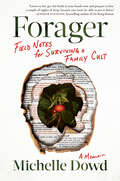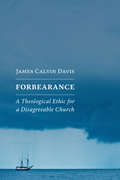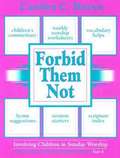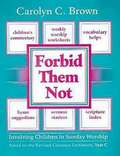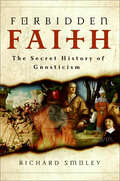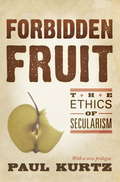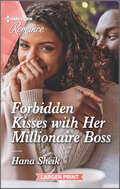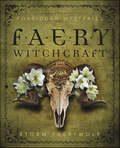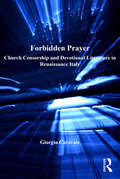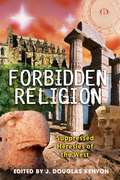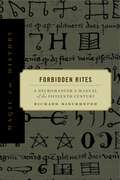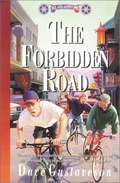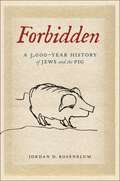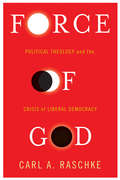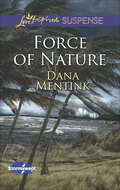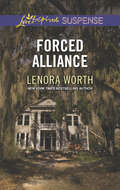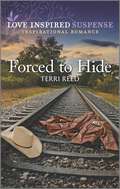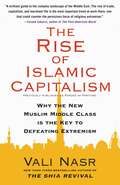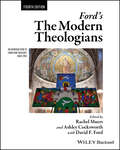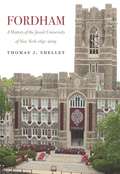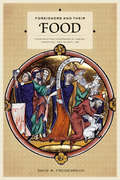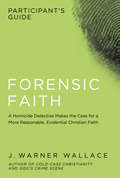- Table View
- List View
Forager: Field Notes for Surviving a Family Cult: a Memoir
by Michelle DowdA moving, heartbreaking, and inspiring true story of the author&’s escape from an apocalyptic cult—and the deep understanding of the natural world that helped her find freedom. My family prepared me for the end of the world, but I know how to survive on what the earth yields. Michelle Dowd grew up on a mountain in the Angeles National Forest, born into an ultra-religious cult—the Field, as members called it—run by her grandfather, who believed that his chosen followers must prepare themselves to survive doomsday. Bound by the group&’s patriarchal rules and literal interpretation of the Bible, Michelle and her siblings lived a life of deprivation, isolated from Outsiders and starved for both love and food. She was forced to learn the skills necessary to battle hunger, thirst, and cold; she learned to trust animals more than humans; and most important, she learned how to survive by foraging for what she needed. And as Michelle got older, she realized she had the strength to break free. Focus on what will sustain, not satiate you, she would tell herself. Use everything. Waste nothing. Get to know the intricacies of the land like the intricacies of your body. And so she did. With haunting and stark language, and illustrations of edible plants and their uses opening each chapter, Forager is a fierce and empowering coming-of-age story and a timely meditation on the ways in which harnessing nature&’s gifts can lead to our freedom.
Forbearance: A Theological Ethic for a Disagreeable Church
by James Calvin DavisOffers a faithful, constructive way to deal with dissent What happens when we approach disagreement not as a problem to solve but as an opportunity to practice Christian virtue? In this book James Calvin Davis reclaims the biblical concept of forbearance to develop a theological ethic for faithful disagreement. Pointing to Ephesians and Colossians, in which Paul challenged his readers to "bear with each other" in spite of differences, Davis draws out a theologically grounded practice in which Christians work hard to maintain unity while still taking seriously matters on which they disagree. The practice of forbearance, Davis argues, offers Christians a dignified, graceful, and constructive way to deal with conflict. Forbearance can also strengthen the church's public witness, offering an antidote to the pervasive divisiveness present in contemporary culture.
Forbid Them Not Year A: Involving Children in Sunday Worship
by Carolyn C. BrownThis resource shows how to create meaningful worship experiences for everyone who comes to your church--children, youth, and adults.A three-volume series based on the Revised Common Lectionary, Forbid Them Not offers specific suggestions for prayers, hymns, litanies, sermon illustrations, and ways to present Scripture so that children--as well as older worshipers--can really hear the message. (Even if your church does not follow the lectionary, you can find suggestions related to any Scripture passage by using the index.)Forbid Them Not, Year A includes 58 full-page, reproducible activity worksheets related to each Sunday's worship theme. With these ideas and resources at hand, you can create worship services that minister to adults and to children.Forbid Them Not, Year B #9781426739026Forbid Them Not, Year C #9781426730719
Forbid Them Not Year C: Involving Children in Sunday Worship
by Carolyn C. BrownComprising 52 reproducible full page worksheets related to each Sunday's worship theme and based on the Revised Common Lectionary, these resources show how to create meaningful worship experiences for children. Includes suggestions for prayers, litanies, and sermon illustrations. Indexed for non-lectionary use.Forbid Them Not, Year A #9781426730726Forbid Them Not, Year B #9781426739026
Forbidden Faith: The Secret History of Gnosticism
by Richard SmoleyScholar Richard Smoley reveals the secret history of the religious doctrines of Gnosticism in Forbidden Faith.The success of books such as Elaine Pagels's Gnostic Gospels and Dan Brown's Da Vinci Code proves beyond a doubt that there is a tremendous thirst today for finding the hidden truths of Christianity—truths that may have been lost or buried by institutional religion over the last two millennia.In Forbidden Faith, Richard Smoley narrates a popular history of one such truth, the ancient esoteric religion of Gnosticism, which flourished between the first and fourth centuries A.D., but whose legacy remains even today, having survived secretly throughout the ages.“Smoley elegantly tracks one of our wildest and most vital inner lineages, the one that comes down through Plotinus, the Gospel of Thomas, the Cathar Perfects, Pico, Blake, Madame Blavatsky, Jung, and the Matrix films.” —Coleman Barks, author of The Essential Rumi“This clear, concise primer traces the Gnostic threads of philosophy, religion, science and popular culture from their biblical references through to their 21st-century appearances in novels and film. Moving easily from one century to the next while at the same time connecting them to each other, Smoley is at once thoughtful and thought-provoking . . . He paves a wide, clear path to understanding it, accessible even to the weekend seeker.” —Publishers Weekly (Starred Review)“Drawing on an impressive mastery of the subject matter, Smoley traces Gnosticism from the first century CE to the present. A compelling and accessible argument. A thoroughly enjoyable read; highly recommended.” —Library Journal
Forbidden Fruit: The Ethics of Secularism
by Paul KurtzAn appropriate challenge to current trends in religion and politics. -Booklist (review of first edition)Paul Kurtz, America's leading secular humanist philosopher, affirms that it is possible to live the good life and be morally responsible, without belief in religion. In this original and penetrating book, Kurtz delineates the means by which humanity can transcend the limitations of traditional religious loyalties and achieve a higher stage of ethics. Fundamentalists deny the possibility of ethics without belief in God. Conservatives rail against secularists. Yet belief in God is no guarantee of moral virtue - as the evils committed in the name of religion have vividly shown. Are there secular ethical principles and values that are vital for a world in crisis?In this new edition of Forbidden Fruit, Kurtz defends the ethics of secularism and humanism. In order to progress to a maximum level of creative development, he maintains that we must be nourished by the forbidden fruit of the knowledge of good and evil, grounding principles and values in autonomous reason. This is the path that leads to the discovery of significant ethical truths that can guide both self-reliant conduct and consideration for the rights of others. By breaking the bonds of theistic illusion, we can summon the courage and wisdom to develop a rational ethic based on a realistic appraisal of nature and an awareness of the centrality of the moral decencies common to all peoples. The ultimate key to the good life, Kurtz writes, is to eat of the fruit of the second tree in the Garden of Eden - the tree of life - discovering for ourselves the manifold potentialities for a bountiful existance. Forbidden Fruit contains important chapters on ethical excellences for individuals, moral education for children, and thoughts on privacy and human rights, in addition to presenting concrete ethical recommendations as alternatives to the reigning orthodoxies. Paul Kurtz, professor emeritus of philosophy at the State University of New York at Buffalo and a fellow of the American Association for the Advancement of Science, is the author or editor of forty-eight books, including The Transcendental Temptation, The Courage to Become, Embracing the Power of Humanism, plus nine hundred articles and reviews. In addition, he is the founder of the Center for Inquiry/Transnational, the Council for Secular Humanism, and the Committee for Skeptical Inquiry. He has appeared on many major TV and radio talk shows, such as Larry King Live, The Oprah Winfrey Show, Good Morning America, Today, and NPR programs. He has lectured at universities worldwide and his books have been translated into many languages.
Forbidden Kisses with Her Millionaire Boss
by Hana SheikWill the heiress be able to resist her tempting boss? Find out in this heartwarming Kwanzaa-set story by Hana Sheik for Harlequin Romance.Can she resist him…While they work together? Heiress Lin dreams of a life different from the one that&’s been planned for her. Traveling from Kenya to Canada to work for renowned tycoon Karl on a Kwanzaa-themed event is thrilling—and their instant, off-limits attraction blows her away! By the time the seven days of Kwanzaa arrive, even the snow outside can&’t cool the sparks between them—especially after their sizzling kiss… But Karl&’s a closed book, so will Lin dare to trust in their unique connection?From Harlequin Romance: Be swept away by glamorous and heartfelt love stories.
Forbidden Mysteries of Faery Witchcraft
by Storm FaerywolfDraw on your inner darkness and unlock the secrets of the Hidden KingdomWhether your demons are ancient spirits or demons of your own making, you must confront them in order to reclaim the power they have stolen. Guiding you through enchantments, demonic rituals, divine possession, necromancy, and occultus maleficum, this book helps you cultivate and explore your forsaken shadows.When you peer behind the veil of comfort and face your most powerful fears, you can truly begin to refine and strengthen your own magical will. In Forbidden Mysteries of Faery Witchcraft, you will learn how to:Summon primal underworld goddesses of the elemental powersWalk the bone road and help trapped spirits cross overBecome a worthy vessel for divine possessionPerform as an oracle, speaking the wisdom of the gods on earthCast and break curses, the dark art of offensive magicThe powerful techniques of the Faery Tradition of Witchcraft await. Through these rituals, you will glimpse the secret inner workings of nature herself and open the doorway to unimagined sources of energy.
Forbidden Prayer: Church Censorship and Devotional Literature in Renaissance Italy (Catholic Christendom, 1300-1700)
by Giorgio CaravaleThis book delineates the attempt, carried out by the Congregations of the Inquisition and the Index during the sixteenth and early seventeenth century, to purge various devotional texts in the Italian vernacular of heterodox beliefs and superstitious elements, while imposing a rigid uniformity in liturgical and devotional practices. The first part of the book is focused on Rome's anxious activity toward the infiltration of Protestant ideas in vernacular treatises on prayer meant for mass consumption. It next explores how, only in the second half of the sixteenth century, once Rome's main preoccupation toward Protestant expansion had subsided, the Church could begin thinking about a move from a rejection of any consideration of the merits of interior prayer to a recovery and acceptance of mental prayer. The final section is dedicated to the primary objective of the Church's actions in purging superstitious practices which was not simply the renewal of the spiritual life of the faithful, but also the control of the religious and social life of many faithful who were uneducated. Based on a careful examination of the archival records of the two Roman dicasteri in question, many of which have only been accessible to scholars since 1998, as well as a close reading of the many of suspect devotional texts themselves, this book offers a fascinating contribution towards a fuller appreciation of the complex landscape that characterized the spiritual realities of early modern Italy.
Forbidden Religion: Suppressed Heresies of the West
by J. Douglas KenyonReveals the thread that unites the spiritual paths that have opposed orthodox religion over the centuries and the challenge they provide to the status quo • Contains 40 essays by 18 key investigators of heresies and suppressed spiritual traditions, including Steven Sora, Ian Lawton, Jeff Nisbet, P.M.H. Atwater, John Chambers, and Vincent Bridges • Edited by Atlantis Rising publisher, J. Douglas Kenyon Following the model of his bestselling Forbidden History, J. Douglas Kenyon has assembled from his bi-monthly journal Atlantis Rising material that explores the hidden path of the religions banned by the orthodox Church--from the time before Christ when the foundations of Christianity were being laid to the tumultuous times of the Cathars and Templars and the Masons of the New World. Revealed in this investigation of the roots of Western faith are the intimate ties of ancient Egyptian religion to Christianity, the true identities of the three magi, the link forged by the Templars between early Christianity and the Masons, and how these hidden religious currents still influence the modern world. This book serves as a compelling introduction to the true history of the heretical religious traditions that played as vital a role in society as the established faiths that continuously tried to suppress them. Born in the same religious ferment that gave birth to Christianity, these spiritual paths survived in the “heresies” of the Middle Ages, and in the theories of the great Renaissance thinkers and their successors, such as Isaac Newton and Giordano Bruno. Brought to the New World by the Masons who inspired the American Revolution, the influence of these forbidden religions can be still found today in “The Star Spangled Banner” and in such Masonic symbols as the pyramid on the back of the dollar bill.
Forbidden Rites: A Necromancer’s Manual of the Fifteenth Century (Magic in History)
by Richard KieckheferPreserved in the Bavarian State Library in Munich is a manuscript that few scholars have noticed and that no one in modern times has treated with the seriousness it deserves. Forbidden Rites consists of an edition of this medieval Latin text with a full commentary, including detailed analysis of the text and its contents, discussion of the historical context, translation of representative sections of the text, and comparison with other necromantic texts of the late Middle Ages. The result is the most vivid and readable introduction to medieval magic now available. Like many medieval texts for the use of magicians, this handbook is a miscellany rather than a systematic treatise. It is exceptional, however, in the scope and variety of its contents—prayers and conjurations, rituals of sympathetic magic, procedures involving astral magic, a catalogue of spirits, lengthy ceremonies for consecrating a book of magic, and other materials. With more detail on particular experiments than the famous thirteenth-century Picatrix and more variety than the Thesaurus Necromantiae ascribed to Roger Bacon, the manual is one of the most interesting and important manuscripts of medieval magic that has yet come to light.
Forbidden Rites: A Necromancer’s Manual of the Fifteenth Century (Magic in History)
by Richard KieckheferPreserved in the Bavarian State Library in Munich is a manuscript that few scholars have noticed and that no one in modern times has treated with the seriousness it deserves. Forbidden Rites consists of an edition of this medieval Latin text with a full commentary, including detailed analysis of the text and its contents, discussion of the historical context, translation of representative sections of the text, and comparison with other necromantic texts of the late Middle Ages. The result is the most vivid and readable introduction to medieval magic now available. Like many medieval texts for the use of magicians, this handbook is a miscellany rather than a systematic treatise. It is exceptional, however, in the scope and variety of its contents—prayers and conjurations, rituals of sympathetic magic, procedures involving astral magic, a catalogue of spirits, lengthy ceremonies for consecrating a book of magic, and other materials. With more detail on particular experiments than the famous thirteenth-century Picatrix and more variety than the Thesaurus Necromantiae ascribed to Roger Bacon, the manual is one of the most interesting and important manuscripts of medieval magic that has yet come to light.
Forbidden Road (Reel Kids Adventures #8)
by Dave Gustaveson[from the back cover] "Would the "Reel Kids'" attempt to smuggle Bibles into China result in their arrest? Jeff Caldwell never thought their bike trip from Beijing to the famous Great Wall would be so difficult. Why was the Chinese police captain so intent on stopping them at every turn? Would their refusal to submit to the captain bring lasting danger to their Chinese translators? In their determination to get to the Great Wall, Jeff and the "Reel Kids" find themselves facing obstacles more severe than the dusty, crowded roads they anticipated. Will they be able to break through the impossible barriers to fulfill their real mission in this ancient land? THE FORBIDDEN ROAD is sure to challenge your faith as you "take off" with the Reel Kids on their international adventure."
Forbidden: A 3,000-Year History of Jews and the Pig
by Jordan D. RosenblumWinner of the 74th National Jewish Book Award: The Jane and Stuart Weitzman Family Award for Food Writing and CookbooksA surprising history of how the pig has influenced Jewish identityJews do not eat pig. This (not always true) observation has been made by both Jews and non-Jews for more than three thousand years and is rooted in biblical law. Though the Torah prohibits eating pig meat, it is not singled out more than other food prohibitions. Horses, rabbits, squirrels, and even vultures, while also not kosher, do not inspire the same level of revulsion for Jews as the pig. The pig has become an iconic symbol for people to signal their Jewishness, non-Jewishness, or rebellion from Judaism. There is nothing in the Bible that suggests Jews are meant to embrace this level of pig-phobia.Starting with the Hebrew Bible, Jordan D. Rosenblum historicizes the emergence of the pig as a key symbol of Jewish identity, from the Roman persecution of ancient rabbis, to the Spanish Inquisition, when so-called Marranos (“Pigs”) converted to Catholicism, to Shakespeare’s writings, to modern memoirs of those leaving Orthodox Judaism. The pig appears in debates about Jewish emancipation in eighteenth-century England and in vaccine conspiracies; in World War II rallying cries, when many American Jewish soldiers were “eating ham for Uncle Sam;” in conversations about pig sandwiches reportedly consumed by Karl Marx; and in recent deliberations about the kosher status of Impossible Pork.All told, there is a rich and varied story about the associations of Jews and pigs over time, both emerging from within Judaism and imposed on Jews by others. Expansive yet accessible, Forbidden offers a captivating look into Jewish history and identity through the lens of the pig.
Force of God
by Carl A. RaschkeFor theorists in search of a political theology that is more responsive to the challenges now facing western democracies, this book tenders a new political economy anchored in a theory of value. The political theology of the future, Carl Raschke argues, must draw on a powerful, hidden impetus-the "force of God"-to frame a new value-economy. It must also embrace a radical, "faith-based" revolutionary style of theory that reconceives the power of the "theological" in political thought and action. Raschke ties democracy's retreat to the West's failure to confront its decadence and mobilize its vast spiritual resources. Worsening debt, rising unemployment, and gross income inequality have led to a crisis in political representation and values that twentieth-century theorists never anticipated. Drawing on the thought of Hegel and Nietzsche as well as recent work by Michel Foucault, Jacques Derrida, Jean-Joseph Goux, Giorgio Agamben, and Alain Badiou, among others, Raschke recasts political theology for a new generation. He proposes a bold, uncompromising critical theory that acknowledges the enduring relevance of Marx without relying strictly on his materialism and builds a vital, more spiritually grounded relationship between politics and the religious imaginary.
Force of God: Political Theology and the Crisis of Liberal Democracy (Insurrections: Critical Studies in Religion, Politics, and Culture)
by Carl RaschkeFor theorists in search of a political theology that is more responsive to the challenges now facing Western democracies, this book tenders a new political economy anchored in a theory of value. The political theology of the future, Carl Raschke argues, must draw on a powerful, hidden impetus—the "force of God"—to frame a new value economy. It must also embrace a radical, "faith-based" revolutionary style of theory that reconceives the power of the "theological" in political thought and action.Raschke ties democracy's retreat to the West's failure to confront its decadence and mobilize its vast spiritual resources. Worsening debt, rising unemployment, and gross income inequality have led to a crisis in political representation and values that twentieth-century theorists never anticipated. Drawing on the thought of Hegel and Nietzsche as well as recent work by Michel Foucault, Jacques Derrida, Jean-Joseph Goux, Giorgio Agamben, and Alain Badiou, among others, Raschke recasts political theology for a new generation. He proposes a bold, uncompromising critical theory that acknowledges the enduring significance of Marx without his materialism and builds a vital, more spiritually grounded relationship between politics and the religious imaginary.
Force of Nature (Stormswept #2)
by Dana MentinkSTORMY REUNION Pulled from the waves and gasping for air, the last person Antonia Verde expects to be her rescuer is Reuben Sandoval. He may once have been the love of her life, but his drug-smuggling brother ruined their chance of happiness. Now with a storm blowing in, Rueben's island hotel is her only refuge. Soon they find themselves trapped on the island with a killer in the midst of a dangerous hurricane. Antonia's life is in Rueben's hands-can she trust him with her heart, as well? Stormswept: Finding true love in the midst of nature's fury
Forced Alliance
by Lenora WorthAN UNEASY PARTNERSHIP By-the-book FBI agent Josie Gilbert has no business falling for her confidential informant, but she can't walk away. She needs this case-her career needs this case. And suave thief turned FBI asset Connor Randall is too deep in the mob syndicate to pull out now. But when the crime boss they are trying to take down becomes a target himself, Josie is forced to take Connor into hiding without blowing his cover. Now, dodging hit men and fighting a perilous attraction, she has to make a life-and-death decision. Can she trust the man who has stolen her heart...or is he working one last con?
Forced to Flee
by Terri ReedAn undercover mission… turns into a cross-country pursuit Rescuing his next-door neighbor from unknown attackers, Jace Armstrong simply appears to be a good Samaritan. But the US marshal is deep undercover, and Abby Frost is a drug cartel&’s unsuspecting target. When the assailants strike again, Jace&’s cover is blown—and their only option is to run. But can Jace get Abby to safety…before she becomes bait in the cartel&’s deadly game?From Love Inspired Suspense: Courage. Danger. Faith.
Forced to Hide
by Terri ReedA bomber is on the loose. Will they be his next victims? When multiple bombs tear through a courtroom, deputy US marshal Brian Forrester must assume guard duty of Judge Adele Weston. Someone wants her dead. Is it the cartel leader whose case she&’s presiding over or an unknown killer from her past? With danger trailing them through the Texas countryside, they&’ll have to find a safe haven before the next explosion finishes them off.From Love Inspired Suspense: Courage. Danger. Faith.
Forces of Fortune: The Rise of the New Muslim Middle Class and What It Will Mean for Our World
by Vali NasrFrom a "New York Times"-bestselling author comes a paradigm-changing revelation of the misunderstood rising force in the Islamic world--a non-extremist new middle class--that holds the key to winning the new Cold War against Iran and extremists.
Ford's The Modern Theologians: An Introduction to Christian Theology since 1918 (The Great Theologians)
by David F. FordCaptures the multiple voices of Christian theology in a diverse and interconnected world through in-depth studies of representative figures and overviews of key movements Providing an unparalleled overview of the subject, The Modern Theologians provides an indispensable guide to the diverse approaches and perspectives within Christian theology from the early twentieth century to the present. Each chapter is written by a leading scholar and explores the development and trajectory of modern theology while presenting critical accounts of a broad range of relevant topics and representative thinkers. The fourth edition of The Modern Theologians is fully updated to provide readers with a clear picture of the broad spectrum and core concerns of modern Christian theology worldwide. It offers new perspectives on key twentieth-century figures and movements from different geographical and ecclesial contexts. There are expanded sections on theological dialogue with non-Christian traditions, and on Christian theology's engagement with the arts and sciences. A new section explores theological responses to urgent global challenges - such as nationalism, racism, and the environmental crisis. Providing the next generation of theologians with the tools needed to take theological conversations forward, The Modern Theologians: Explores Christian theology's engagement with multiple ways of knowing across diverse approaches and traditions Combines introductions to key modern theologians and coverage of the major movements within contemporary theology Identifies common dynamics found across theologies to enable cross-contextual comparisons Positions individual theologians in geographical regions, trans-local movements, and ecclesial contexts Features new and revised chapters written by experts in particular movements, topics, and individuals Providing in-depth critical evaluation and extensive references to further readings and research, Ford's The Modern Theologians: An Introduction to Christian Theology since 1918, Fourth Edition, remains an ideal textbook for undergraduate and graduate courses in Theology and Religious Studies, such as Introduction to Christian Theology, Systematic Theology, Modern Theology, and Modern Theologians. It is also an invaluable resource for researchers, those involved in various forms of Christian ministry, teachers of religious studies, and general readers engaged in independent study.
Fordham, A History of the Jesuit University of New York: 1841-2003
by Thomas J. ShelleyBased largely on archival sources in the United States and Rome, this book documents the evolution of Fordham from a small diocesan college into a major American Jesuit and Catholic university. It places the development of Fordham within the context of the massive expansion of Catholic higher education that tookplace in the United States in the twentieth century. This was reflected at Fordham in its transformation from a local commuter college to a predominantly residential institution that now attracts students from 48 states and 65 foreign countries to its three undergraduate schools and seven graduate and professional schools with an enrollment of more than 15,000 students.This is honest history that gives due credit to Fordham for its many academic achievements, but it also recognizes that Fordham shared the shortcomings of many Catholic colleges in the United States in the nineteenth and early twentieth centuries. There was an ongoing struggle between Jesuit faculty who wished to adhere closely to the traditional Jesuit ratio studiorum and those who recognized the need for Fordham to modernize its curriculum to meet the demands of the regional accrediting agencies.In recent decades, like virtually all American Catholic universities and colleges, the ownership of Fordham has been transferred from the Society of Jesus to a predominantly lay board of trustees. At the same time, the sharp decline in the number of Jesuit administrators and faculty has intensified the challenge of offeringa first-rate education while maintaining Fordham’s Catholic and Jesuit identity.June 2016 is the 175th anniversary of the founding of Fordham University, and this comprehensive history of a beloved and renowned New York City institution of higher learning will help contribute to celebrating this momentous occasion.
Foreigners and Their Food: Constructing Otherness in Jewish, Christian, and Islamic Law
by David M. FreidenreichForeigners and Their Food explores how Jews, Christians, and Muslims conceptualize "us" and "them" through rules about the preparation of food by adherents of other religions and the act of eating with such outsiders. David M. Freidenreich analyzes the significance of food to religious formation, elucidating the ways ancient and medieval scholars use food restrictions to think about the "other." Freidenreich illuminates the subtly different ways Jews, Christians, and Muslims perceive themselves, and he demonstrates how these distinctive self-conceptions shape ideas about religious foreigners and communal boundaries. This work, the first to analyze change over time across the legal literatures of Judaism, Christianity, and Islam, makes path-breaking contributions to the history of interreligious intolerance and to the comparative study of religion.
Forensic Faith Participant's Guide: A Homicide Detective Makes the Case for a More Reasonable, Evidential Christian Faith
by J. Warner WallaceThis eight-week companion guide to Forensic Faith takes readers through the investigative techniques that J. Warner Wallace learned from his decades as a homicide detective. Designed to be used alongside the Forensic Faith book and DVD, this interactive guide helps readers in all seasons of faith become better "Christian Case Makers."
